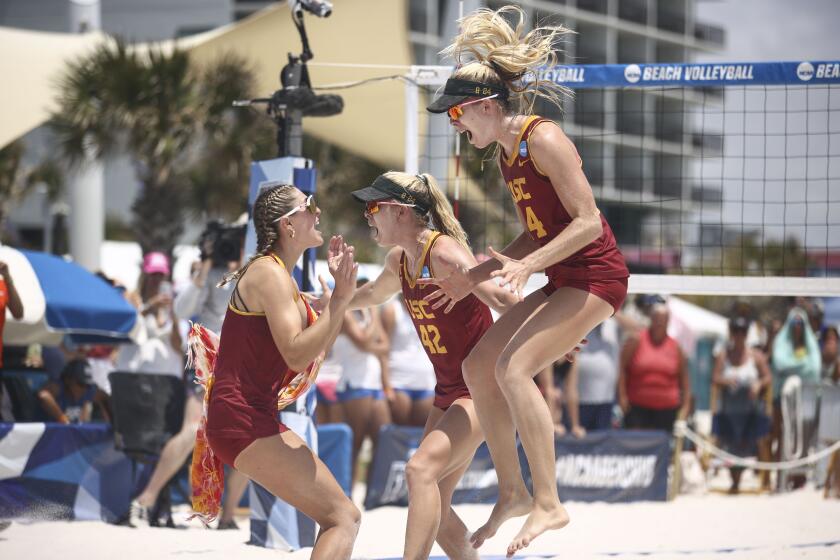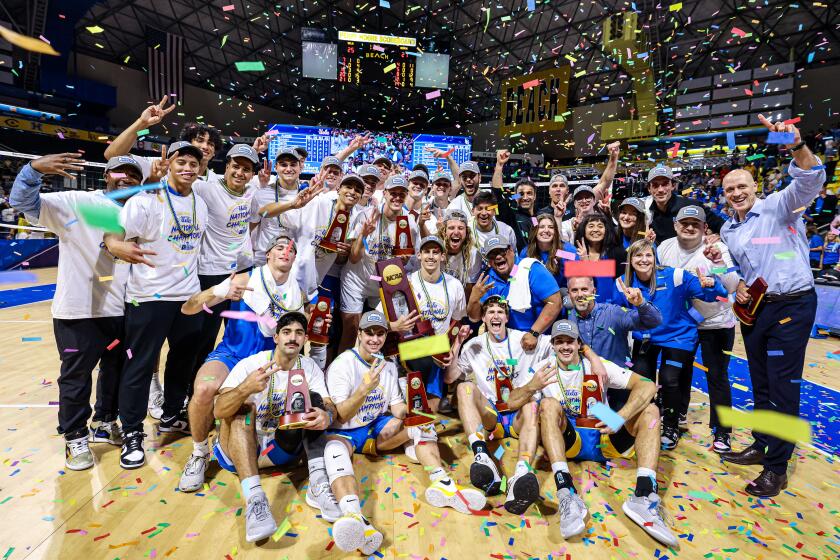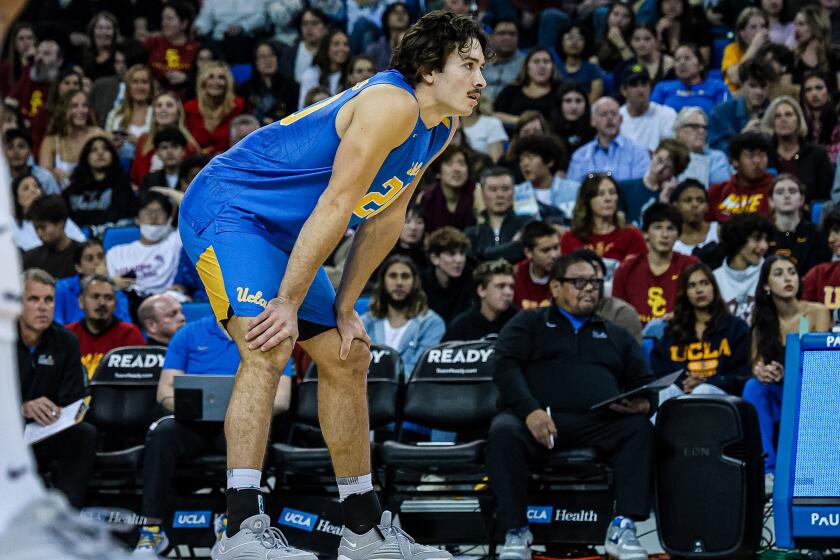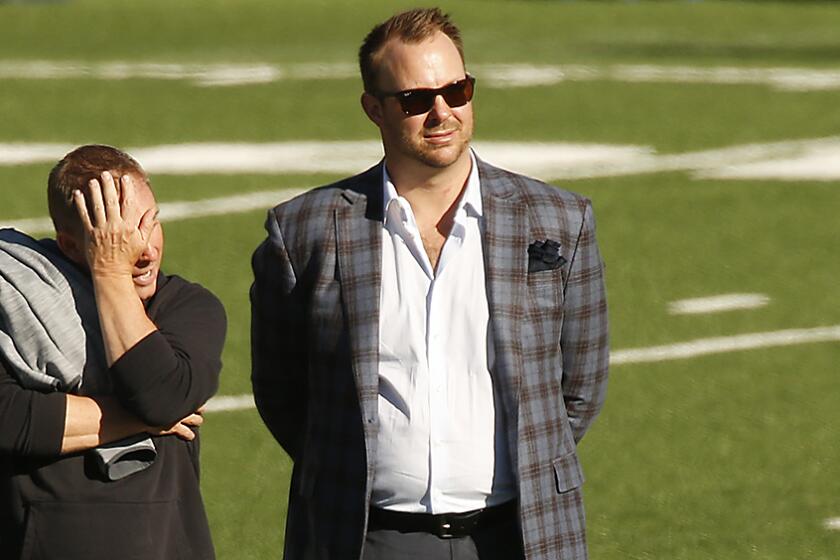Toledo finds shelter from storm at Tulane
That Bob Toledo would end up coaching football at Tulane is sort of like the bread pudding souffle they serve up here: too rich.
Four years after a seven-year record of 49-32 got him fired at UCLA, Toledo in December accepted a Conference USA mop-up mission that reacquainted him with uncomfortable parts of his past.
“A hurricane and a quarterback I lost,” Toledo, seated in his office chair, said with a laugh. “It’s amazing.”
Hurricane Katrina, which remains New Orleans’ boarded-up backdrop, would link Toledo full circle to Hurricane Georges, which in 1998 postponed UCLA’s game with Miami from September to December, which may have led to a slipped-tackle loss that may have cost UCLA the national title.
“One game changed my career,” Toledo said of that 49-45 loss to Miami.
And so, he could argue, did one quarterback.
His name was J.P. Losman, a prized recruit out of Venice High who enrolled early at UCLA in 1999, quit after 15 spring practices, and transferred to ... Tulane.
If not for a hurricane and a quarterback ...
If UCLA beats Miami in 1998, and then defeats Tennessee in the Bowl Championship Series title game, Toledo’s career might not have sputtered to a halt in 2002.
Momentum might have kept UCLA on top and upstart Pete Carroll at bay. The equity of a national title might have allowed Toledo to survive the handicapped parking-placard scandal and other indiscretions that handed firing fodder to incoming Athletic Director Dan Guerrero.
Don’t coaches with national title rings get a little more rope?
“Look at SC,” Toledo said, “you don’t think they’ve had some problems?”
Ah, but for a hurricane ...
“Killed us,” Toledo said of Georges.
And a quarterback ...
“He would have been the next great quarterback at UCLA if he would have been patient enough,” Toledo says of Losman, who used Tulane, not UCLA, as his springboard to a starting job with the Buffalo Bills.
Because UCLA had locked up Losman, it didn’t recruit Kyle Boller, who went to California, which led to a painful patchwork progression for the Bruins that included Cory Paus, Ryan McCann and Scott McEwan.
This is known in the Toledo era as: the beginning of the end.
Life’s funny, and then you get fired, and then you move on.
Toledo moved here, first to a small apartment near campus on St. Charles Avenue. With three grown daughters leading lives of their own, Toledo and wife Elaine were ready for new digs and Southern roots.
Of course, in terms of the hurricanes in Toledo’s life, the difference between Katrina and Georges wasn’t even close.
Many of the Tulane players inherited from Chris Scelfo, fired after producing two winning seasons since 1998, remain in stages of recovery.
Toledo watched Katrina unfold as most everyone else did, on television, never imagining that less than two years later he’d be part of the recovery effort.
“You go over that little bridge, go down there, it’s frightening,” Toledo said of a recent visit to the 9th Ward. “It’s like a ghost town, it just makes you cringe. You realize these were real people and they’re not there anymore. Their houses are boarded up. They’re gone. There are steps leading up to a house and there’s no house. It’s devastating.”
Toledo took the Tulane job because he likes challenges, and he picked a doozy in Dixie.
After playing 11 games in 11 cities in 2005, the Green Wave returned home last season in the full throes of Katrina fatigue.
Toledo, who turned 61 in March, decided this was a good fit to make his last (probably) coaching stand.
After his 2002 firing, Toledo spent three seasons out of football until hitching on last year as offensive coordinator at New Mexico.
Toledo still views his UCLA axing as inevitable from the day Guerrero was named athletic director in April 2002.
“He didn’t only get rid of me,” Toledo said. “The basketball coach [Steve Lavin] is no longer there. The baseball coach [Gary Adams] is no longer there.”
It remains an open question as to how much better UCLA football has been since Toledo.
Karl Dorrell, who succeeded Toledo, is 29-21 through his first four years.
Toledo thought he deserved another year. His 2002 team won eight games playing 22 freshmen. “We were going to be fine,” he said.
But the UCLA hierarchy was angered by off-the-field issues that included the handicapped-parking scandal, tailback DeShaun Foster’s untoward ties to a 2002 Ford Expedition, and drunk driving convictions involving quarterback Paus.
Losing four straight years to USC didn’t help.
Toledo sat and listened as a reporter read excerpts from comments Guerrero recently made about the state of UCLA football under Dorrell.
* “I am very appreciative that Karl came in and reestablished order in the program in a lot of ways.”
* “He rebuilt the foundation that I felt needed to be fixed in a lot of ways.”
* “He came in and healed the program.”
Toledo bristled in his chair.
“That’s his opinion,” he said. “He [Guerrero] wasn’t around long enough to know.”
Toledo said he would accept blame for problems in his program if he didn’t try to stop them.
“I did everything I could,” he said. “I constantly talked about staying out of trouble, don’t do the wrong thing.”
He said he invited Art Shell to meet with the team and recalls the former Raiders coach looking Foster in the eye and warning the star tailback to steer clear of trouble.
Three seasons away allowed Toledo time to recharge. He became a football-watching junkie and spent makeup time with his wife and daughters. He bounced grandchildren on his knees, played golf four days a week. But after a while, even bliss gets old.
“I’ve often thought that people should retire at about 40 and then come back and finish up the rest of life instead of retiring and die,” Toledo said.
Toledo may never get the chance to win a national title again, but he says he thinks he can win Conference USA.
“I see a better football team than I thought would be here,” Toledo said.
You have to look hard to find the positive on Tulane’s football timeline. It played in the 1932 Rose Bowl, losing to USC, but the program is probably more noted for having the stadium that hosted the Sugar Bowl and three Super Bowls before being demolished in 1980.
Mack Brown and Tommy Bowden stopped by for coaching visits on their way to the top. In 1998, the year Toledo really had UCLA going, Bowden led Tulane to an undefeated season and a No. 10 final BCS ranking.
Predicting Tulane’s future is an iffy proposition.
The Green Wave returns 13 scholarship seniors and is building next season around senior tailback Matt Forte, whom Toledo thinks will play in the NFL. Toledo hired a staff with mostly Southern ties and instructed his coaches to keep more local players at home.
Louisiana State, the Southeastern Conference powerhouse up the road in Baton Rouge, is not necessarily worried.
At a recent function at which both were speaking, Toledo quipped about LSU Coach Les Miles: “I wish he’d leave us some players.”
Tulane plays LSU in the Superdome on Sept. 29.
Toledo does bring to Tulane an outsider’s perspective.
As horrible as Katrina was, he says, the football team had to stop using the disaster as an excuse.
“You never forget about it, you shouldn’t forget about it, because it was devastating,” Toledo said. “But you’ve got to move on with your life. You can’t keep dwelling on Katrina. You can’t keep saying we don’t lift weights because we don’t have a weight room. We’ve got a weight room now, let’s go lift weights.”
Still, this is a bungee-jump career drop from Westwood, from that loss to Miami in 1998.
The game was scheduled for September, before those young-but-talented Hurricanes grew up.
“We would have beaten them earlier in the year,” Toledo still insists. “No question. A lot of people have said that.”
UCLA still needed only one tackle to beat Miami in December, but that game exposed a program chasm as it opened wounds between a record-setting offense and a suspiciously porous defense.
Toledo watched it unravel in the locker room, with UCLA players “throwing chairs and kicking over garbage cans.”
The Bruins became the first team in the BCS era to accept a Rose Bowl bid as a consolation prize. They lost the Rose Bowl too.
The next spring, Losman, poised to take the torch from Cade McNown, checked into spring practice -- and then checked out.
“He wanted to be like guaranteed he was going to be the starter, and I wasn’t about to do that,” Toledo said.
Losman left UCLA and eventually ended up at Tulane.
Bob Toledo has done the same.
Times staff writer Chris Foster contributed to this report.
Go beyond the scoreboard
Get the latest on L.A.'s teams in the daily Sports Report newsletter.
You may occasionally receive promotional content from the Los Angeles Times.




